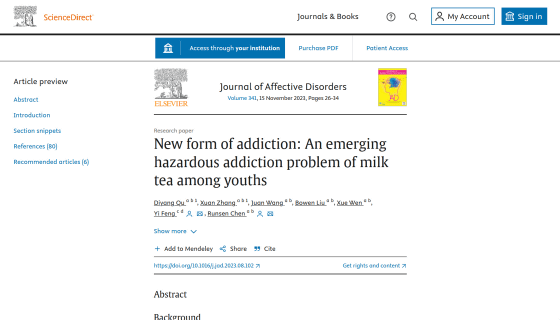'Milk tea addiction', which is increasing among young people, may be related to depression

In recent years, 'sweet milk tea' including tapioca drinks has become popular in Asian countries such as Japan and China. A study of university students in Beijing, China, showed that the stronger the tendency to become dependent on milk tea (milk tea addiction), the higher the risk of depression and loneliness.
New form of addiction: An emerging hazardous addiction problem of milk tea among youths - ScienceDirect

Rising Addiction to Milk Tea Linked to Depression in Adolescents : ScienceAlert
https://www.sciencealert.com/rising-addiction-to-milk-tea-linked-to-depression-in-adolescents
Sweet drinks based on milk tea have become popular in recent years, but previous research has shown that an unhealthy diet that includes milk tea is associated with mental health problems. Therefore, a research team from China's Tsinghua University and the Central University of Finance and Economics conducted a study targeting 5,281 university students living in Beijing, China.
In addition to measuring how much milk tea the participants consumed, the study also measured how much milk tea dependence they consumed, based on substance use guidelines from the American Psychiatric Association's DSM-5 (Diagnostic and Statistical Manual of Mental Disorders, 5th Edition). Trends in the disease were also investigated. The research team said, ``Although milk tea addiction is not formally classified in the DSM-5, it is gradually emerging as a significant public health concern.''
The survey results showed that 77% of the participants had consumed 6 to 11 cups of milk tea in the past year, and about half drank more than 1 cup of milk tea per week. It was reported that 20.6% of the subjects drank 2 to 3 cups of milk tea per week, and 2.6% of the subjects drank 4 to 6 cups of milk tea per week.

The research team also created questions to examine trends in milk tea addiction according to DSM-5. Questions included ``Do you ever drink more milk tea for a longer period of time than you intended?'' ``Have you tried multiple times without success to stop drinking milk tea?'' ``Have you experienced any distress?'' ``Do you often rely on milk tea when you feel like it?'' ``Do you continue to consume milk tea even though you are aware of its negative effects?'' ``Gradually, you develop a tolerance to milk tea and increase the amount you drink.'' Questions included whether the need has arisen, and whether withdrawal symptoms will occur if you stop or reduce your milk tea intake.
The research team analyzed the results of questions regarding the subjects' milk tea addiction tendencies and mental health, and found that subjects with higher levels of milk tea addiction had a higher risk of depression, anxiety, suicidal thoughts, and loneliness. got it.
This study only clarified the relationship between milk tea addiction trends and mental health problems, and did not show a causal relationship that ``drinking milk tea has a negative impact on mental health.'' However,
The research team said: 'Our findings highlight that milk tea consumption can lead to addiction, which is associated with depression, anxiety and suicidal thoughts. 'This will help policy makers develop rules such as limiting advertising, providing psychoeducation and establishing food hygiene standards to protect young people's mental health while allowing youth-centered consumer industries to thrive.' Ta.

A forum related to this article has been set up on the GIGAZINE official Discord server. Anyone can write freely, so please feel free to comment!
• Discord | 'Do you want to add sugar to your milk tea? Or not?' | GIGAZINE
https://discord.com/channels/1037961069903216680/1158705203936239626
Related Posts:







